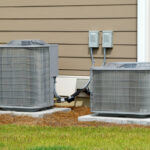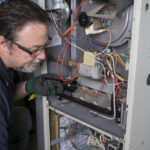The scorching heat of summer can turn even the most enthusiastic sun-lover into a sweaty puddle of discomfort. In such unbearable conditions, we often seek refuge in the cool embrace of air conditioning. However, deciding between a traditional central air conditioner and a heat pump can be a daunting task. Which one is more energy-efficient? Which one provides better overall comfort? In this article, we aim to break down the differences and help you make an informed decision for your home.
A central air conditioner and a heat pump are both essential components in any modern HVAC system, responsible for cooling and dehumidifying our living spaces. While they function based on similar principles, there are notable differences that distinguish the two. Understanding these disparities will enable you to choose the system that best suits your needs, while also considering energy efficiency and long-term costs.
1. How They Work
Both central air conditioners and heat pumps work by extracting heat from inside our homes and expelling it outdoors. They achieve this by leveraging the evaporation and condensation of a refrigerant. However, a central air conditioner and a heat pump differ in terms of their operation modes.
A central air conditioner solely performs the function of cooling. It absorbs heat from the indoor air, transferring it to the outdoor unit where it is released. On the other hand, a heat pump is a versatile system that can both cool during summer and provide warmth during winter. By reversing its cycle, a heat pump can extract heat from the outside even in cold weather conditions and bring it indoors, providing a comfortable temperature all year round.
2. Energy Efficiency
When it comes to energy efficiency, heat pumps have a noticeable advantage over central air conditioners. While both systems use electricity to operate, heat pumps provide heating using much less energy compared to electric furnaces or baseboard heaters, making them a more sustainable choice.
Heat pumps accomplish this by transferring heat rather than generating it through electrical resistance. They extract existing heat from the environment, whether it be from the outdoor air or the ground (known as ground-source heat pumps or geothermal heat pumps). This innovative technology enables heat pumps to achieve impressive energy efficiency ratios (EERs) and coefficient of performances (COPs), leading to lower utility bills and a reduced environmental impact.
In contrast, despite providing effective cooling, central air conditioners solely rely on consuming electricity to run compressors, fans, and other components. Consequently, they generally use more resources to achieve the same cooling effect.
3. Climate Considerations
While heat pumps offer great benefits in terms of energy efficiency, their performance can be influenced by the local climate. In regions with extremely cold temperatures, heat pumps may struggle to extract sufficient heat from the outside air. In such cases, supplementary heat sources might be required to ensure optimal comfort.
On the other hand, central air conditioners excel in hot and dry climates where cooling is the primary concern. They do not depend on the outdoor temperature, making them a reliable option in areas where winter seasons are mild.
4. Installation and Cost Factors
Installing a central air conditioner or a heat pump involves different considerations that can influence your decision-making process. Generally, the installation of a heat pump is more complex, requiring professional help to correctly hook up and balance the indoor and outdoor units. Additionally, if opting for a ground-source heat pump, digging or drilling may be necessary, adding to the installation costs.
Comparatively, central air conditioner installation tends to be simpler and less costly since it does not involve the complexity of heat pump systems. However, it is essential to note that the overall cost depends on factors such as the size of the home, existing ductwork, insulation, and individual requirements.
5. Maintenance and Lifespan
Maintenance needs and the lifespan of central air conditioners and heat pumps are similar. Both systems require regular cleaning and periodic servicing to ensure optimal performance and longevity. Filters need to be replaced, coils should be cleaned, and refrigerant levels must be checked to avoid any issues.
In terms of lifespan, both central air conditioners and heat pumps can last up to 15-20 years, with regular maintenance and care. Proper usage and routine inspections by HVAC professionals are crucial to maximizing their lifespan and minimizing the need for expensive repairs.
6. Noise Considerations
Another factor to consider when choosing between a central air conditioner and a heat pump is the noise they produce during operation. Heat pumps tend to be quieter due to the absence of a traditional air conditioner’s compressor noise. Some heat pumps also feature advanced technology with sound-dampening capabilities, ensuring a peaceful indoor environment.
In contrast, central air conditioners tend to be somewhat louder, with their compressors generating noticeable noise levels. While advancements in technology have led to quieter central air conditioner models, noise-sensitive individuals may still prefer the superior noise reduction offered by heat pumps.
Choosing between a central air conditioner and a heat pump ultimately comes down to your specific needs and climate considerations. While both effectively cool indoor spaces, heat pumps provide the added advantage of year-round heating capabilities and enhanced energy efficiency. The climate you live in, installation costs, maintenance requirements, and noise considerations should all be factored into your decision. By carefully assessing these aspects, you can select the HVAC system that will create a comfortable and cost-effective environment in your home for years to come.







